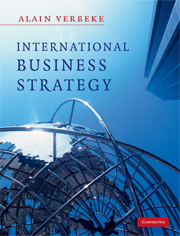Book contents
- Frontmatter
- Contents
- List of figures
- List of case studies
- About the author
- Foreword
- Acknowledgements
- List of abbreviations
- Walkthrough
- Introduction and overview of the book's framework
- Part I Core concepts
- 1 Conceptual foundations of international business strategy
- 2 The critical role of firm-specific advantages (FSAs)
- 3 The nature of home country location advantages
- 4 The problem with host country location advantages
- 5 Combining firm-specific advantages and location advantages in a multinational network
- Part II Functional issues
- Part III Dynamics of global strategy
- Conclusion. The true foundations of global corporate success
- Appendix: Suggested additional readings
- Index
1 - Conceptual foundations of international business strategy
from Part I - Core concepts
- Frontmatter
- Contents
- List of figures
- List of case studies
- About the author
- Foreword
- Acknowledgements
- List of abbreviations
- Walkthrough
- Introduction and overview of the book's framework
- Part I Core concepts
- 1 Conceptual foundations of international business strategy
- 2 The critical role of firm-specific advantages (FSAs)
- 3 The nature of home country location advantages
- 4 The problem with host country location advantages
- 5 Combining firm-specific advantages and location advantages in a multinational network
- Part II Functional issues
- Part III Dynamics of global strategy
- Conclusion. The true foundations of global corporate success
- Appendix: Suggested additional readings
- Index
Summary
In this chapter, we will look in greater detail at each of the seven concepts of this book's unifying framework. The reader will recall the seven concepts, shown again in Figure 1.1:
1. Internationally transferable (or non-location-bound) firm-specific advantages (FSAs)
2. Non-transferable (or location-bound) FSAs
3. Location advantages
4. Investment in – and value creation through – recombination
5. Complementary resources of external actors (not shown explicitly in figure)
6. Bounded rationality
7. Bounded reliability
Let us start by discussing internationally transferable FSAs.
Internationally transferable FSAs and the four MNE archetypes
The MNE creates value and satisfies stakeholder needs by operating across national borders. When crossing its home country border to create value in a host country, the MNE is, almost by definition, at a disadvantage as compared to firms from the host country, because these firms possess a knowledge base that is more appropriately matched to local stakeholder requirements. The MNE incurs additional costs of doing business abroad, resulting from cultural, economic, institutional and spatial distance between home and host country environments. MNE managers often find it particularly difficult to anticipate the liability of foreignness resulting from the cultural and institutional differences with their home country environments, even though these may be reduced over time as the firm learns and gains increased legitimacy in the host country.
In order to overcome these additional costs of doing business abroad, the MNE must have proprietary internal strengths, such as technological, marketing or administrative (governance-related) knowledge.
- Type
- Chapter
- Information
- International Business StrategyRethinking the Foundations of Global Corporate Success, pp. 13 - 76Publisher: Cambridge University PressPrint publication year: 2009



